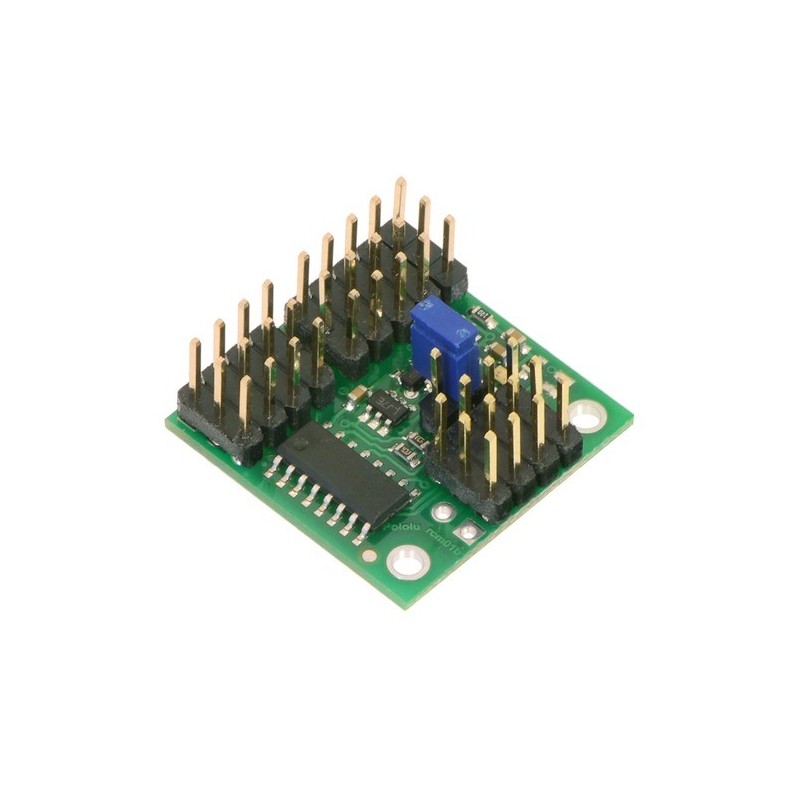



55,43 zł Netto
Multiplexer w wersji zmontowanej umożliwia szybkie i niezawodne przełączanie czterech kanałów RC pomiędzy dwoma źródłami sterowania bez potrzeby lutowania. Moduł sprawdzi się w systemach szkoleniowych typu „buddy”, projektach z przełączaniem sterowania ręcznego i autonomicznego oraz w aplikacjach wymagających bezpiecznego i elastycznego zarządzania sygnałami RC. Pololu 2806
Gotowy do użycia, czterokanałowy multiplekser sygnałów RC, przeznaczony do przełączania sterowania serwami lub regulatorami ESC pomiędzy dwoma niezależnymi źródłami sygnału. Wybór aktywnego źródła (MASTER lub SLAVE) odbywa się za pomocą dodatkowego kanału RC SEL, analizującego szerokość impulsu sterującego.
Wersja montowana fabrycznie została wyposażona w przylutowane piny goldpin 2,54 mm, dzięki czemu możliwa jest bezpośrednia integracja z typowymi systemami modelarskimi RC bez konieczności lutowania.
Producent BTC Korporacja sp. z o. o. Lwowska 5 05-120 Legionowo Polska sprzedaz@kamami.pl 22 767 36 20
Osoba odpowiedzialna BTC Korporacja sp. z o. o. Lwowska 5 05-120 Legionowo Polska sprzedaz@kamami.pl 22 767 36 20
Moduł z 16-kanałowym sterownikiem serwomechanizmów PCA9685 przeznaczony dla minikomputerów Raspberry Pi. Płytka wyposażona jest w złącze zasilające USB Typ C. SparkFun DEV-15316
Uniwersalny tester serwomechanizmów oraz regulatorów ESC. Umożliwia sprawdzenie działania serwa bez potrzeby korzystania z nadajnika i odbiornika
Brak towaru
Uniwersalny tester serwomechanizmów oraz regulatorów ESC. Umożliwia sprawdzenie działania serwa bez potrzeby korzystania z nadajnika i odbiornika
Uniwersalny tester serwomechanizmów oraz regulatorów ESC. Umożliwia sprawdzenie działania serwa bez potrzeby korzystania z nadajnika i odbiornika
Moduł z 16-kanałowym sterownikiem PWM PCA9685. Płytka została wyposażona w złącze Grove i komunikuje się przez interfejs I2C. Seeed Studio 108020102
Brak towaru
Moduł 16-kanałowego sterownika serw z interfejsem I2C oparty o układ PCA9685. modPCA9685
Brak towaru
Moduł z 2-kanałowym sterownikiem silników DC TB6612FNG przeznaczony do współpracy z micro:bit. Może sterować także 3 serwami. SB Components 14897
Sterownik serwomechanizmów z interfejsem szeregowym UART. Wyposażony w moduł ESP32 z komunikacją bezprzewodową WiFi i Bluetooth. Waveshare Servo Driver with ESP32
Brak towaru
Sterownik serwomechanizmów oparty na mikrokontrolerze Raspberry Pi RP2040. Pozwala na sterowanie do 18 serw, ma 6 wejść analogowych oraz złącze QW/ST do podłączenia dodatkowych czujników. Pimoroni PIM613
Sterownik serwomechanizmów 8-kanałów z potencjometrami to wszechstronne urządzenie umożliwiające kontrolę wielu serwomechanizmów jednocześnie. Dzięki szerokiemu zakresowi napięcia jest idealnym rozwiązaniem dla projektów robotycznych i zdalnie sterowanych aplikacji
Sterownik dedykowany do serwomechanizmów wyposażonych w interfejs szeregowy UART. Pozwala na kontrolowanie aż 253 serw z serii ST/SC, co czyni go idealnym rozwiązaniem w przypadku projektów robotów kroczących czy manipulatorów. Waveshare Bus Servo Adapter (A)
Moduł sterowania serwem o zakresie ruchu 180 stopni, Nie wymaga programowania i jest idealny do operacji takich jak otwieranie i zamykanie ust, dłoni czy oczu. Sterowanie odbywa się za pomocą wbudowanego układu ATTiny13A, przycisku oraz potencjometru, a każdy naciśnięty przycisk przesuwa serwo na drugi koniec zakresu, z możliwością regulacji długości ruchu. Kitronik 2177
Kompaktowy sterownik serw oparty na układzie PCA9685, który umożliwia równoczesne sterowanie aż 16 serwomechanizmami RC. Płytka ma wbudowane złącze Edge Connector do bezpośredniego podłączenia micro:bit oraz pady w standardzie Link, co ułatwia integrację z innymi modułami. Zasilanie można doprowadzić przez blok zacisków lub złącza serw, a wbudowany wyłącznik i dioda LED ułatwiają obsługę. Sterownik udostępnia stabilizowane wyjście 3,3 V dla micro:bit i dodatkowych urządzeń, dzięki czemu może pełnić rolę centralnego modułu w projekcie. Kitronik 5694
Płytka rozszerzeń dla BBC micro:bit, umożliwiająca łatwe podłączenie i sterowanie serwomechanizmami niskiej mocy. Standardowo obsługuje dwa serwa, a po wyłączeniu wbudowanych diod ZIP LED nawet trzy. Zasilana trzema bateriami AAA, jednocześnie dostarcza energii do micro:bit, a włącznik chroni przed niepotrzebnym rozładowaniem. Dzięki pięciu diodom RGB ZIP LED oraz możliwości podłączenia dodatkowych, płytka pozwala na atrakcyjne efekty świetlne i jest idealna do projektów robotycznych, takich jak :MOVE mini. Kitronik 5623
Kompaktowy sterownik XIAO Bus Servo Adapter z modułem XIAO ESP32-C3, umożliwiające precyzyjne sterowanie serwomechanizmami ST/SC przez interfejs UART. Dzięki solidnej konstrukcji i zasilaniu 5–12 V pozwala na jednoczesną kontrolę wielu serw, co sprawdza się w robotach humanoidalnych, sześcionożnych i ramionach robotycznych. Wsparcie Arduino IDE, otwarta architektura oraz łatwy montaż czynią go doskonałym narzędziem do edukacji, prototypowania i zaawansowanych projektów robotycznych. Seeed Studio 114993612
Zaawansowany sterownik serwomechanizmów z obsługą komunikacji UART i USB, umożliwiający precyzyjne sterowanie wieloma serwami jednocześnie. Kompaktowa konstrukcja i stabilne zasilanie przez złącze śrubowe sprawiają, że urządzenie świetnie nadaje się do integracji w robotach i systemach automatyki o ograniczonej przestrzeni. Współpraca z ekosystemem Seeed Studio XIAO oraz zastosowanie magistrali szeregowej zamiast tradycyjnego PWM zapewniają efektywną, skalowalną i niezawodną kontrolę w projektach edukacyjnych, badawczych i DIY. Seeed Studio 105990190

Multiplexer w wersji zmontowanej umożliwia szybkie i niezawodne przełączanie czterech kanałów RC pomiędzy dwoma źródłami sterowania bez potrzeby lutowania. Moduł sprawdzi się w systemach szkoleniowych typu „buddy”, projektach z przełączaniem sterowania ręcznego i autonomicznego oraz w aplikacjach wymagających bezpiecznego i elastycznego zarządzania sygnałami RC. Pololu 2806
